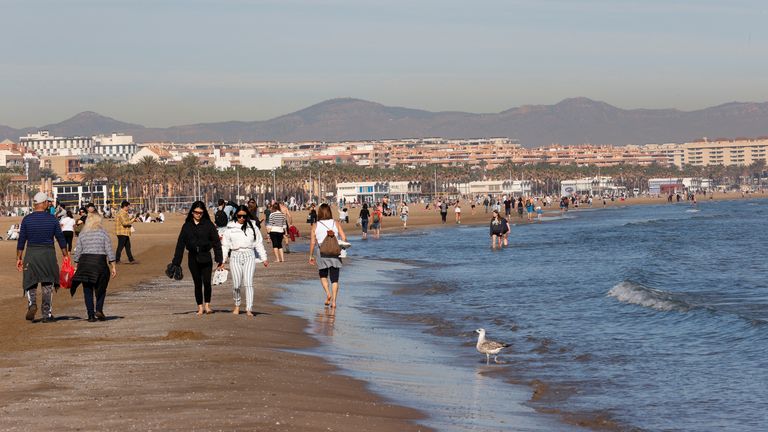Temperatures in southern Spain today reached just over 28C – the second-highest value recorded in January since 1985.
AEMET, Spain’s state meteorological agency, reported that maximum temperatures recorded at one observatory in the Mediterranean region of Murcia hit 28.2C.
At another, provisional data showed the temperature peaked at 28.5C.
The unusually warm weather came close to breaking records, becoming the second-highest value recorded at one observatory for January in 38 years, the agency said in a post on X.
Many other parts of Spain also enjoyed temperatures in the 20s, including Alicante which had a maximum temperature of 25C and Granada with 26C.
The warm weather lured people outside, with many pictured sunbathing or playing volleyball on a beach in Valencia, which also reached temperatures in the mid-20s.
Despite enjoying the weather, some tourists expressed concern for the unusually hot temperatures.
“We’re a bit surprised that it’s so pleasantly warm… And it’s nice for us now, but we don’t think it’s completely normal,” Thorsten Petersen, 66, said while in Madrid.
Adela, a local pensioner, added: “Those who say there is no climate change just have to look at what’s happening: it’s either too cold or too warm. I think this is a disaster.”
Scientists have linked scorching temperatures and dry and windy conditions in many parts of the world, including southern Europe, to climate change.
Read more on Sky News:
Japanese man sentenced to death after killing 36 people
Consider UK conscription, says Britain’s former top NATO commander
Last year was confirmed as the hottest on record, according to data, with the global average air surface temperature hitting 14.98C in 2023 – beating the previous record set in 2016.
In Spain alone, the record temperatures caused consecutive heatwaves which sparked wildfires and droughts.
Temperatures in neighbouring Portugal also reached 23C in some regions on Thursday, with the weather agency IPMA expecting Friday to reach 24C – around eight to nine degrees above normal levels.

Emily Foster is a globe-trotting journalist based in the UK. Her articles offer readers a global perspective on international events, exploring complex geopolitical issues and providing a nuanced view of the world’s most pressing challenges.










